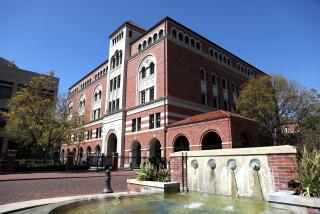Ex-Chief of Willed Body Program Arrested
- Share via
CORONA — The former chief of a willed body program was arrested Friday on suspicion of stealing a medical school corpse, according to authorities who searched his freezers full of body parts.
The investigation was triggered when Orange Coast College in Costa Mesa bought the cadaver for $1,100, and then protested to Western University of Health Sciences in Pomona that the body was poorly preserved. Western University officials said they did not know the cadaver was missing, and alerted Pomona police.
Early Friday, they searched the private offices of Phillip Joe Guyett Jr., 32, who had been in charge of the university’s willed cadaver program until he quit in March. What they found initially caused them to believe they had uncovered evidence of multiple homicides.
At the office, located in an industrial complex, investigators found two commercial freezers filled with skulls, a head, what appeared to be a heart, and other body parts.
By day’s end, Guyett had produced death certificates and other documents to show “that all the parts were legitimate,” said Corona Police Sgt. Eddie Garcia.
Guyett was arrested on a felony citation for suspicion of embezzlement but was not jailed. He helped inventory the frozen parts for the Riverside County coroner’s office and Sheriff’s Department.
It is unclear--and police are investigating--how Guyett acquired the body parts and the cadaver, which he was selling through his companies, California Anatomical Society and IDK Information Services, according to Pomona Police Capt. Joe Romero.
The case is the second in recent weeks involving a Southern California willed body program. Last month, UC Irvine announced the dismissal of its program director, Christopher S. Brown, who is suspected of selling the university’s cadaver parts for personal profit and steering business to associates.
The Orange County district attorney’s office is conducting an embezzlement investigation of the program, but Brown--who has not been charged with a crime--has denied any wrongdoing and said he kept his supervisors informed of his activities.
On Friday, Guyett, who remains enrolled as a student in the university’s physician’s assistant program, declined to speak with reporters who swarmed to his office. His suite had no signs identifying the type of business or what was stored there.
Bill Mitchell, a Riverside County prosecutor at the scene, said: “It appears from the evidence we’ve gathered so far that he was in the business of sending parts of donated cadavers to research facilities that wanted them. He was a middle man between the donated cadaver and body parts and the recipients.”
Mitchell said his office is still investigating whether Guyett had violated any law, the Business and Professions Code or the state’s Health and Safety Code.
Christopher N. Oberg, Western University’s executive vice president, said Friday that after Guyett quit in March as director of the school’s willed body program, questions arose “about the incomplete nature of the program’s record-keeping.”
The university was still trying to piece together Guyett’s records when it received a complaint last week from Orange Coast College about the quality of a cadaver that the university did not even realize had been released, Oberg said. Furthermore, he said, there was no record that Western University had received money for it, although Orange Coast said a check had been mailed.
Oberg said the medical school handles about 90 cadavers a year, and that no other cadavers were believed to be missing.
Orange Coast College ordered the cadaver March 3 from Guyett, who identified himself as a staff member of Western’s willed cadaver program, said Stan Johnson, dean of mathematics and science at Orange Coast.
The community college, which enrolls about 300 students in its anatomy program each semester, typically obtains a cadaver or two a year from UC Irvine and UC San Diego.
The cadaver arrived later that month and appeared in fine condition, although it lacked a required state form for disposition of human remains. The form was delivered a few days later from IDK.
At the time, Johnson said, no one thought it odd that a private company--IDK--was billing for a cadaver from Western University.
The cadaver was stored until August when fall classes began. By then, it was starting to mold, a sign it had not been properly embalmed. A call to IDK yielded a disconnected phone line, Johnson said, and the college complained to Western University.
The medical school, Johnson said, has offered to replace the cadaver.
Times Community News reporter Douglas Haberman contributed to this story.
More to Read
Sign up for Essential California
The most important California stories and recommendations in your inbox every morning.
You may occasionally receive promotional content from the Los Angeles Times.













